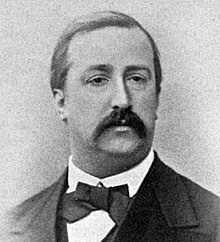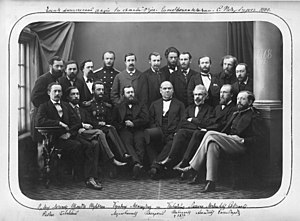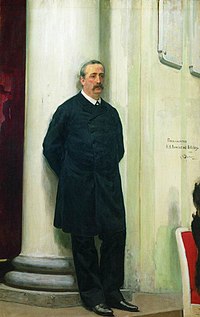| Edit | Map | Home | New Post | New Gallery |
Support
|
 | |
Alexander Porfiryevich Borodin ( October 31 ( November 12 ) , 1833 , St. Petersburg - February 15 ( 27 ), 1887 , in the same place) - Russian composer , organic chemist, public figure, physician. Member of the " Mighty Handful ". Alexander Borodin was born in St. Petersburg on October 31 ( November 12 ), 1833 from an extramarital affair between the Georgian prince from Imereti Luka Gedianov (Gedevanishvili) (1772-1843) and the St. Petersburg bourgeois Avdotya Antonova (1809-1873 [ ). At birth, he was recorded as the son of a serf servant of the prince - Porfiry Borodin and his wife Tatyana. Until the age of eight, the boy was a serfhis father, who in 1840 gave his son freedom and bought a four-story house for him and his mother, who was married in 1839 to retired military doctor Christian Kleinecke (died no later than 1841). In the first half of the 19th century, extramarital affairs were not advertised, so young Sasha called Avdotya Antonova (at her request) not “mother”, but “aunt” . In the 1840s, Avdotya (Kleinecke) gave birth to two more sons - Dmitry Alexandrov (born 1844, father unknown) and Evgeny Fedorov (born c. 1847, father - collegiate secretary, teacher of the German language Fyodor Fedorov). With both brothers, Alexander Borodin maintained a close relationship all his life. Due to his origin, which did not allow him to enter the gymnasium , Borodin was educated at home in all subjects of the gymnasium course, took English and Latin lessons (he spoke French and German fluently in his youth), learned to play the flute, piano and cello . Around 1847 he wrote a concerto for flute and piano (the work has not been preserved). From the age of ten, Borodin was interested in chemistry , which eventually became his professional occupation. Science and higher education were hindered by the same “illegal” origin of the young man, which, in the absence of a legal possibility of changing social status, forced Borodin’s mother and her husband to use the office of officials of the Tver Treasury Chamber to enroll their son in the Novotorzhskoye Third Guild merchant class . He received the right to finish the gymnasium and continue his education in a higher educational institution. In the summer of 1850, Borodin passed the matriculation exams at the First St. Petersburg Gymnasium , and in September, the seventeen-year-old "merchant" Alexander Borodin entered the St. Petersburg Medical-Surgical Academy (IMHA) as a volunteer . In 1853, he began studying chemistry at the academy under the guidance of Nikolai Zinin , who played a decisive role in Borodin's further professional career. The personality of Zinin, a researcher devoted to science and at the same time a caring mentor, left a deep imprint on the personality of Borodin . While studying at IMHA, Borodin wrote romances , piano pieces, chamber instrumental ensembles, which caused dissatisfaction with Zinin, who believed that music lessons interfere with serious scientific work. Biographers of Borodin often quote Zinin's statement, made by him publicly, in front of witnesses:
After graduating from IMCA (in March 1856), he began working as an intern at the Second Military Land Hospital , in April of the same year he became an assistant at the Department of General Pathology and General Therapy at IMCA, a little later, as an assistant to Zinin, he conducted practical seminars for students, and since 1859 he has already lectured them on chemistry. In 1857, Borodin passed the exam for the degree of Doctor of Medicine , and in March 1858 in St. Petersburg he defended his dissertation with a topic at the intersection of chemistry and medicine - "On the analogy of arsenic acid with phosphoric acid in chemical and toxicological relations" . Borodin spent the summer of that year in Soligalich(Kostroma province), where he studied the composition of the mineral waters of the local hydropathic. The results of the study, published by him in 1859 in the Moskovskie Vedomosti newspaper (No. 130, June 3; the work was republished as a separate brochure under the title "Soligalich salt-mineral waters"), served as the opening of a medical resort that to this day . In October 1856, while on duty in the hospital, Borodin met Modest Mussorgsky , who served as an officer on duty there. The young doctor and the young officer found a common language on the basis of music, their contacts did not stop in the future. At the next meeting in the autumn of the same year, Mussorgsky's creative experiments made a great impression on Borodin:
Foreign business trip (1859-1862)In 1857, Borodin first went to Europe (Belgium, Germany, France), acting as secretary and translator of the ophthalmologist of the royal court I. I. Kabat . In October 1859, under the patronage of Zinin, Borodin went on probation abroad to prepare for the post of adjunct professor of chemistry . For almost three years he worked mainly in chemical laboratories in Germany ( Heidelberg ) and Italy ( Pisa ), he also traveled to France and Switzerland. In September 1860, Borodin, along with N. N. Zinin and D. I. Mendeleev, attended the famous international congress of chemists in Karlsruhe . Here, clear definitions were given to the concepts of " atom " and " molecule " ("particle", "corpuscle"), which meant the final triumph of the atomic-molecular theory of the structure of matter , and the so-called. "new" atomic weights established by the works of the French chemist Gerard and his students . In 1861, in Heidelberg, Borodin developed a method for obtaining bromo-substituted acids and discovered the reaction now known as the Borodin-Hunsdiecker reaction [25] . In May 1861, in Heidelberg, Borodin met Ekaterina Sergeevna Protopopova (1832-1887), who suffered from a chronic lung disease and came to Germany for treatment. Protopopova turned out to be a good pianist (she studied, among others, with the Czech pianist Julius Shulhof ) and possessed perfect pitch [27] . She was an admirer of Chopin and Schumann , and gave amateur concerts of new (romantic) chamber music. Fresh musical impressions stimulated Borodin's interest in composition - his cello sonata on a theme by J. S. Bach , a string trio and a string sextet, a scherzo appearedfor piano four hands. In September, Ekaterina Sergeevna's health deteriorated. The Heidelberg professor recommended that she urgently change the climate and go south to Italy. Borodin accompanied Protopopova on this trip. After meeting with professors of chemistry from the University of Pisa Sebastiano de Luca and Paolo Tassinari , who warmly welcomed the Russian colleague, Borodin got the opportunity to work in the laboratory of the local university. There, in 1862, for the first time in the history of chemistry, he received an organofluorine compound - benzoyl fluoride - and found a method for obtaining fluoroanhydrides of carboxylic acids. In Italy, Borodin also did not leave music lessons and composed a piano quintet . Mature yearsIn September 1862, Borodin returned to St. Petersburg, in the same autumn he met M.A. Balakirev and joined his circle, which later became known as the “ Mighty Handful ”. In December of the same year, he became an adjunct professor at the Medico-Surgical Academy and began teaching a course in inorganic chemistry there . In March 1864, he headed the Department of Chemistry as an ordinary professor. On April 17, 1863, Borodin married E. S. Protopopova, whom he continuously took care of, supported spiritually and (not least) financially for the rest of his life. Ekaterina Sergeevna did not tolerate the St. Petersburg climate well: in the fall she usually left for Moscow, where she lived with her mother for a long time, returning to her husband only in winter, when dry frosty weather set in St. Petersburg. However, this still did not guarantee her the absence of attacks of the disease, during which her husband was both a doctor and a nurse for her. Ekaterina Sergeevna smoked a lot, suffered from insomnia and fell asleep only in the morning. With all this, a tenderly loving and respectable spouse had to put up with. The Borodins spent the summer of 1865 in the south of Austria , near Graz , where Borodin wrote the First Symphony (completed at the end of that year). Social activitiesBorodin's merit to society is his active participation in the creation and development of opportunities for women to receive higher education in Russia: he was one of the organizers of the Higher Women's Medical Courses , where he taught chemistry from 1872 to 1885 . Since 1874, he was the treasurer of the Society for the Benefit to Students of Medical and Pedagogical Courses. One of the founding members of the Russian Chemical Society (1868). In 1870-1871 he was one of the editors of the journal Knowledge. Borodin devoted considerable time to working with students and, using his authority, defended them from political persecution by the authorities in the period after the assassination of Emperor Alexander II . Recent yearsIn 1882-1883. Borodin visited the so-called " Belyaev Fridays", where new (mainly chamber) music by Russian composers was played. As part of these Fridays, the musicians planned a collective composition - a string quartet, for which at the end of 1882 Borodin wrote one of the parts - a scherzo. The extreme (fast) sections of the scherzo are written in five-beat meter , they sound almost without pauses, forming a continuous rapid flow of music. For the middle (slow) section, the composer used the music of the Merchants' Tale (who brought the news of the Prince's defeat) from the opera Prince Igor. Now this piece (under the title "Russian Scherzo") is performed independently. In recent years, Borodin complained of pain in his heart. The description of his sudden death is given in the memoirs of M. V. Dobroslavina. Borodin died of a heart attack on the evening of February 15 (27), 1887 in a state-owned "academic" apartment, in the midst of general fun at a costume party organized by him on the occasion of Shrovetide . During a conversation with Dobroslavina, Borodin suddenly lost consciousness and fell:
He was buried at the Tikhvin cemetery in the Alexander Nevsky Lavra (St. Petersburg). Musical creativityUnder the influence of M. A. Balakirev, V. V. Stasov and other members of this creative association, Borodin’s musical and aesthetic position developed as an adherent of the Russian national school in music and a follower of M. I. Glinka . The great employment of Borodin, as well as high demands on himself, explains the small number of completed musical composition. The most significant work of Borodin is the opera Prince Igor , on which the composer worked for 18 years, but never finished it. After the death of Borodin, the opera was completed and orchestrated based on materials from Borodin, N. A. Rimsky-Korsakov and A. K. Glazunov . In this edition, the opera was first staged in 1890 at the Saint Petersburg Mariinsky Theatre . In the last third of the 20th century, new attempts were made to reconstruct the opera. As edited by Yu. A. Fortunatovand E. M. Levashov, it was staged in 1974 in Vilnius, in 1993 - in Genoa and Moscow . By the grandeur of the concept, by the brightness of the disclosure of national characters, Borodin's opera at the end of the 20th century was compared with the novel "War and Peace" by L. N. Tolstoy and the artistic canvases of V. I. Surikov . Borodin proved to be an innovator in orchestral music, for the first time embodying the principles of epic dramaturgy in the symphonic genre. The premiere of the First Symphony (1865) took place in 1869 with the RMS orchestra conducted by M. A. Balakirev. The piano score and score were published by V. V. Bessel in 1875 and 1882, respectively. The pinnacle of Borodin's orchestral music is the Second Symphony (the work in the clavier was completed in 1871, orchestrated in 1873 ), which V. V. Stasov called "Bogatyrskaya" . Its first performance took place in 1877 under the direction of E. F. Napravnik . The piano score of the Second Symphony was first published in 1876, the score - in 1887 (posthumously), as revised by N. A. Rimsky-Korsakov and A. K. Glazunov, who made significant changes to its music [41] . Both symphonies already during the life of Borodin received recognition abroad. Particularly popular was the First - with a triumphant success for the first time abroad, it was performed in Baden-Baden in 1880, and a little later - in Amsterdam, Antwerp, Budapest, Dresden, Leipzig (1883, under the direction of Arthur Nikisch ), Monaco, Cologne. Borodin's best chamber instrumental works include the First and Second String Quartets, presented to music connoisseurs in 1879 and 1881. In the last years of his life, Borodin worked on the Third Quartet. Borodin is not only a master of instrumental music, but also of chamber vocal lyrics, a striking example of which is the elegy “For the Shores of the Far-Off Homeland” (1881) to the words of A. S. Pushkin . The composer enriched the romance genre with images of the Russian heroic epic , for example, in The Sleeping Princess (1st publication 1870) and Song of the Dark Forest (1st publication 1873). An example of Borodin's satire is the song "Haughtiness" (1884; to the words of A. K. Tolstoy ) . In " Prince Igor ", in symphonies, in vocal lyrics, Borodin avoids the decorativeness characteristic of quasi-folk and essentially eclectic stylization. Thus, a feeling of genuine archaism, the authenticity of the image of Ancient Russia , which the composer draws , is achieved . Borodin's work is distinguished by a deep penetration into the structure of both Russian folk songs and the music of the peoples of the East (in the opera "Prince Igor", the symphonic picture "In Central Asia" and other works). ReceptionWhen the Soviet art critic Vladimir Blok wrote about the epic nature of Pyotr Ilyich Tchaikovsky's Symphony in E flat major , he traced its origins to the work of Alexander Borodin and pointed out that the first themes of this symphony appeared in Tchaikovsky's notebook just when he was preparing to introduce foreign audiences with Borodin's First Symphony, and this symphony itself was written in E-flat major, like the work of Tchaikovsky himself [46] . The traditions of Borodin's music were adopted by Soviet composers S. S. Prokofiev , Yu. A. Shaporin , R. M. Glier , G. V. Sviridov , A. I. Khachaturian and others.
Borodin's music was the basis for Kismet , an American musical with an oriental theme (1953); especially popular was the song " Stranger in Paradise ", which is an arrangement of the Borodin choir "Fly away on the wings of the wind" (since 1954, the song was successfully performed by Tony Bennett ). A later arrangement of the same chorus (1997) is by African-American rapper Warren G. |
Author: Sonya Version: 1 Language: English Views: 0
|
Short link: https://www.sponsorschoose.org/a230
Short link to this version: https://www.sponsorschoose.org/n258
Created by Sonya at 2023-06-27 02:40:10
Last modified by Sonya at 2023-06-27 04:41:50
|




